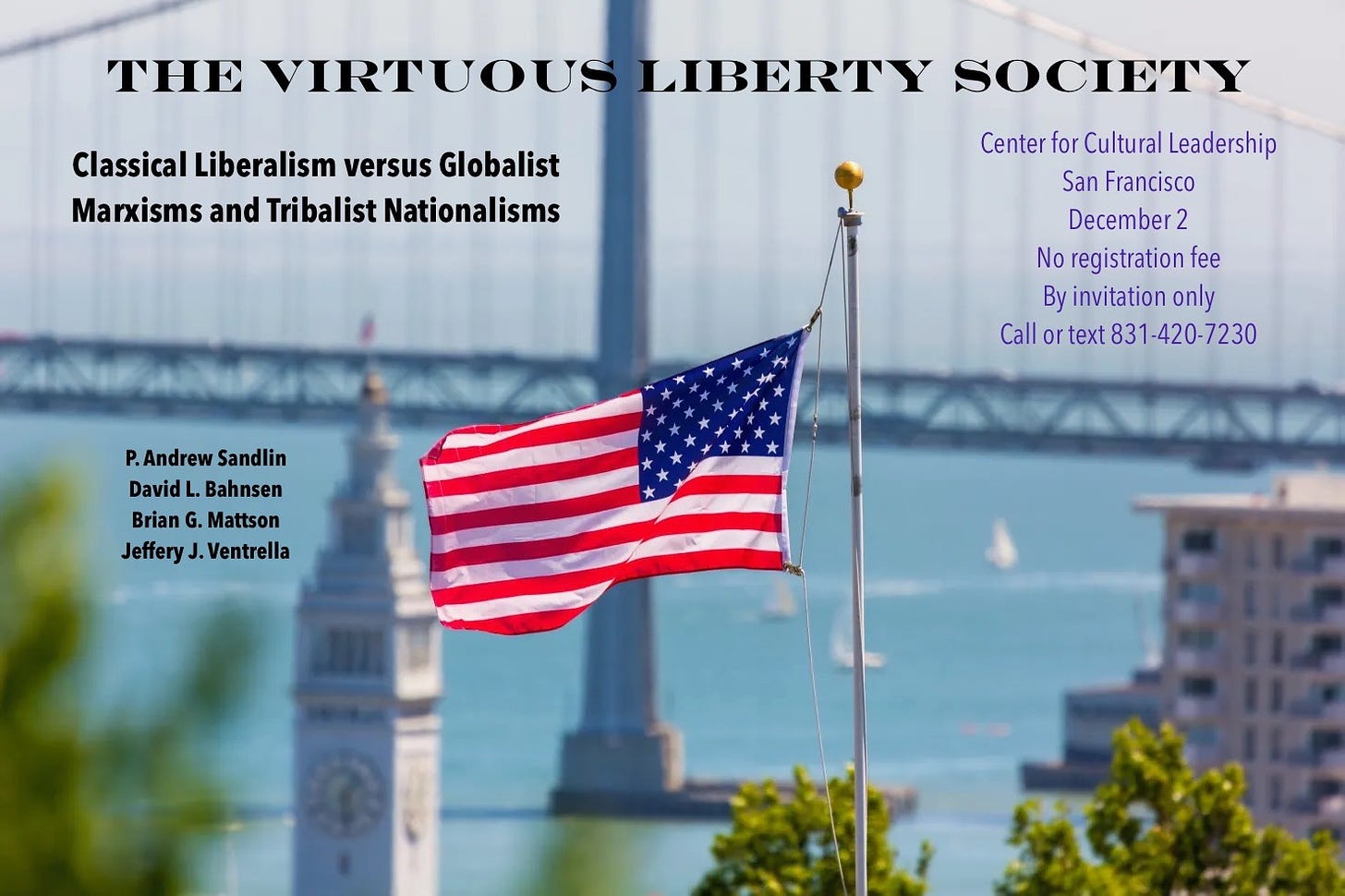What Is Christian Worldview?
A Christian worldview means that our thinking is always and everywhere governed by Christian presuppositions, to the extent this is possible in a fallen world.
Adapted and expanded from a worldview talk delivered to high school and college students on July 29, 2023 in Charlotte, North Carolina
Dear friends and supporters:
No doubt you’ve heard that expression “Christian worldview.” Perhaps you’ve used it yourself. Sometimes we use expressions without knowing precisely what they mean. When we’re asked to define them, we’re less certain about their meaning than we thought we were. This is true of love. We know just what it is — until we’re obliged to articulate it. This is often true of Christian worldview.
What is Christian worldview? First, we need to know what a worldview is. It’s a rough translation of the German word Weltanschauung (/ˈveltänˌSHouo͝oNG/):
It means a picture of the world that we carry in our minds. It’s a vision of what the world is and what man’s place is in the world. We interpret everything in terms of this picture, this worldview. This means that knowledge is not simply the result of sense impressions bouncing off our mind, as David Hume thought. Immanuel Kant was more correct that the mind has pre-established categories for interpreting sense data. Knowledge is the interface between sense data and innate mental categories. But Kant’s so-called “Copernican Revolution” in epistemology (theory of knowledge) was less revolutionary than he supposed. We learn the truth from the Bible.1
Worldview and the Bible
The Bible doesn’t use the term worldview, of course, but it certainly implies something very much like it. In Romans 12:1–2, Paul writes that we’re to be renewed by the transformation of our minds, that is, our mind should be molded by Jesus Christ in his word. We also learn from 1 Corinthians 2:14 that “a natural person [unbeliever] does not accept the things of the Spirit of God, for they are foolishness to him; and he cannot understand them, because they are spiritually discerned.” Those spiritually discerning Christians Paul spoke about have the mind of Christ (1 Cor. 2:16) — they interpret all of reality, all of creation, as Christ revealed it. Our spiritual condition molds all our knowledge.
Worldviews Inescapable and Many
Worldviews are like pancreases. Everybody has one, whether you know it or not. We begin to develop a worldview at the earliest age, certainly as toddlers. In fact, it’s possible that even pre-born children are already forming a worldview.
There are numerous worldviews, and many of them overlap. There’s not only a Christian worldview, but also a Darwinist worldview, a Marxist worldview, a Hindu worldview, an Islamic worldview, a New Age worldview, and even a Satanist Worldview. Although no worldview is entirely consistent in practice, each worldview shapes not just the way we think, but the way we act and live. This is because what we think influences how we act. The Bible tells us that as a man thinks in his heart, so is he (Prov. 23:7). This is why we should never discount ideas and thinking and concentrate only on actions and practices. Actions and practices are the result of thinking, and more broadly, worldview.
A Christian worldview is one that sees the world in distinctly Christian terms. God’s revelation in his word and in creation shapes our thinking and understanding. This means we Christians don’t perceive the world the way non-Christians perceive it. There’s a clear difference between the Christian worldview and all of its alternatives. It’s not just that Christians don’t act like non-Christians; they don’t think like non-Christians. That’s why they don’t act like them. (cont. below)
I'm sometimes asked the best place in the Bible to start for proving postmillennialism. I reply, “Genesis 1:1.” An optimistic eschatology rests in an optimistic protology. The sovereign Creator fashioned a very good creation that will fulfill his kingdom-expanding dominion purposes in time and history.
This primer shows what an optimistic eschatology looks like.
Get hard copy and e-books here. Contact me privately (sandlin[at]saber[dot]net) for quantity pricing (10+ copies).
(cont.)
Cultivating Christian Worldview
We cultivate a Christian worldview by consciously immersing ourselves in Christian revelation: Jesus Christ, the Bible, and creation (as interpreted by the Bible). God’s word tells us how to live in his created order under the authority of our cosmic Lord. If we want to think like a Christian, we must ground our thoughts in Christian revelation, illuminated by the indwelling Holy Spirit. Nobody who avoids immersion in the Bible is serious about Christian worldview.
Of course, not everything we need to know is found in the Bible. We won’t find in the Bible the value of pi, the specifics of the human neurological system, or a recipe for carrot cake. Creation is a vast reservoir of necessary truth, but that information must always be read through the lens of the Bible: it was never meant to be self-sufficient. Even in Eden, Adam and Eve needed God’s word for direction. Today there is a massive reversion to “natural law,” that is, ethics specifically excluding the revelation of Jesus Christ and the Bible. But creation and the Bible are mutually reinforcing. Creation is not equal to “nature,” and “natural law” is the attempt to de-Christianize creation. This is why among the late medieval scholastics, “natural law would have force even if there were no God.”2 Consistent, irreversible “natural law” leads to atheism — and it did historically.
The Unevangelized Mind
One of our big problems in Christianity today is that most Christians lack a Christian worldview. It’s possible to be a Christian, to trust in Christ for salvation, to possess eternal life, without having a Christian worldview. Indeed, this describes most Christians these days. They’ve given their life to Jesus Christ, but their mind is not Christian. They have an unevangelized mind.3 Christian youth attend church on Sunday, perhaps even attend a Christian school, or are homeschooled, and yet most of the time they think in a non-Christian way.
On Sunday, they hear about Jesus Christ and the gospel and living a godly life, but on Monday through Saturday they think like a non-Christian. Their sexuality is “straight,” but they believe it’s OK for anybody else to decide what gender he, or she (or it!) is. They believe they’re going to heaven when they die, but they believe they basically get to call the shots in their life. They believe the federal government should tax wealthier people to give money to less wealthy or poorer people. Or they might believe that adultery is wrong, but believe that premarital sex is permissible. They oppose racism, as they should, but they think colleges and businesses should have racial quotas for enrollment or hiring, respectively. They believe God created man and woman, but these “genders” are interchangeable — anything men can do women should be able to do. They might believe having children in marriage is optional. They might believe that if two people are “incompatible” in marriage, they may simply get a divorce.
They basically believe, whether they acknowledge it or not, that God can have their mind on Sunday, but the world can have their mind on Monday through Saturday. They embrace what we might call epistemic duality. That is, they have two competing sources of knowledge governing their thinking. They have the Christian source from the Bible they hear in church and maybe their Christian school or homeschool. And then they have the non-Christian source that’s their “normal” way of thinking most of the time.
A Christian worldview is designed to abolish this epistemic duality. A Christian worldview means our thinking is always and everywhere governed by Christian presuppositions, to the extent this is possible in a fallen world.
In a culture assaulted at every point by anti-Christian thinking, you can see why few things are more vital than a Christian worldview.
Will you consider a tax-deductible donation to CCL via PayPal or Venmo? Or mail a check to CCL, Box 100, Coulterville, CA 95311. God uses you to keep us going — and expanding.
Please contact me privately to secure your place at the December 2 symposium:
Personal
The essay collection Virtuous Liberty: A Christian Defense of Classical Liberalism Against Cultural Leftism and the New Right with contributors David L. Bahnsen, Joseph Boot, Kevin D. Johnson, Brian G. Mattson, P. Andrew Sandlin, Richard A. Sandlin, Levi Secord, Robert Sirico, and Jeffery J. Ventrella will make a clear, bold, biblical case for society rooted in God’s moral law guaranteeing maximal liberty for individuals, families, churches, and businesses. It’s scheduled for release later this year.
Upcoming posts here at CultureChange include “Chronological Snobberies,” “Jesus Christ’s Thisworldly Kingdom Versus John Piper’s Otherwordly Pietism,” “Pagan Masculinity, Double-Cure Soteriology, and Common-Good Liberty,” and “Does Christian Orthodoxy Require Rugged Individualism?”
Thank you deeply for your friendship and support.
Yours for the King,
Founder & President, Center for Cultural Leadership
More great stuff:
The Center for Cultural Leadership site is here.
My Amazon author page (print and digital) is here.
My I-Tunes sermons, lectures and podcasts are here.
You can find my sermons and lectures at my YouTube channel.
Sign up to get my blog updates here.
Here’s my Twitter feed.
If you want to get the free exclusive hard copy publication Christian Culture, please send me a Facebook private message.
The CCL phone number is 831-420-7230.
The mailing address is:
Center for Cultural Leadership
P. O. Box 100
Coulterville, CA 95311
See John M. Frame, The Doctrine of the Knowledge of God (Phillipsburg, New Jersey: P & R Publishing, 1987).
Heinrich A. Rommen, The Natural Law (Indianapolis: Liberty Fund, 1998), 57.
Thomas F. Torrance, “The Reconciliation of Mind: A Theological Meditation upon the Teaching of St. Paul,” in Theology in the Service of the Church, Wallace M. Alston Jr., ed. (Grand Rapids: Eerdmans, 2000), 196–204.









This weekend, I was serving at a dinner event where a man named David Eagleman was speaking. Such a wealth of knowledge, science and the brain. Backed by many deep pockets, his research and product development is extremely impressive and valuable. Especially to the hearing impaired, blind and even the elderly. In this article “Our spiritual condition molds all our knowledge.” I thought how much more could this man know (or we) within this field if we do work like this with acknowledging that it’s not Mother Nature, but God who created the brain and it’s complexities, not Mother Nature but God that shows and helps us learn these things. What a thing that could be!